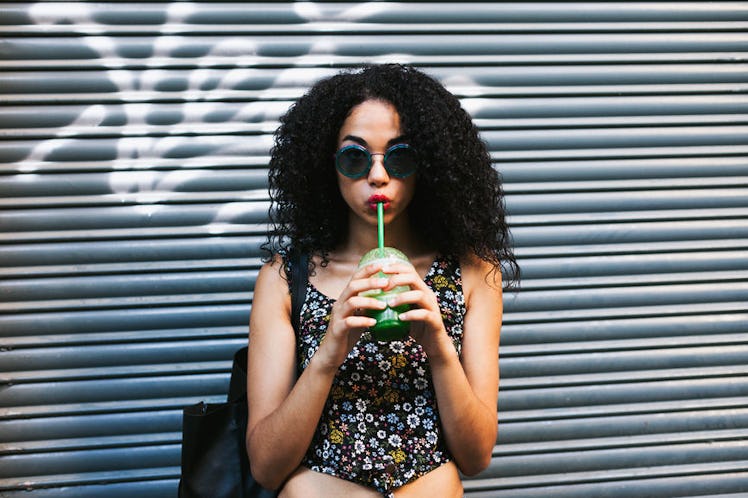
The One Switch In Your Diet That Could Help Your Painful PMS, According To Experts
Keeping an emergency bag packed with super-plus tampons, ibuprofen, and perhaps a chocolate dessert (or three) may sound like a cliche, but for anyone who has a heavy period, complete with both monstrous cramps and a ridiculous amount of bleeding, this is basically a way of life once a month, every month. What's worse, though, is that these things, for many women, only offer temporary solutions. Now, it might sound random, but if you're looking for a more long-term way to manage your PMS symptoms, following a vegan diet might help your heavy period and all the discomfort that comes with it. At least, for one woman, the diet switch worked like a charm.
In a recent article for Women's Health, Nivea Mullings, a freelance writer and founder of the blog Black Vegan Diaries, wrote about how switching to a plant-based diet essentially transformed her periods for the better. Even after just one month of eating vegan, she wrote, she "still had some cramps and bloating, but it was nowhere near as bad as before." Now, over a year later, Mullings said she's still sticking to plant-based foods in her diet, and while some days are better than others, she's found that overall, the switch has "transformed" her life "for the better," and has made a huge difference in her debilitating PMS symptoms, which she said included cramps, bloating, and even bouts of depression.
Clearly, a vegan diet made a huge difference for Mullings, but can this way of eating have the same effects on other women's bodies, too? Well, according to Jennie Miremadi, MS, CNS, LDN, a licensed integrative clinical nutritionist and functional medicine practitioner, it's not exactly that a vegan diet is a magical, foolproof cure for painful PMS symptoms. Rather, she explains, it's all about how these foods affect your hormone levels when you eat them.
"Heavy periods can be a symptom of high estrogen and low progesterone," Miremadi tells Elite Daily over email. "If a client came to me with this issue, I would look at [their] hormone levels and then tailor specific foods to help balance hormones." And while she says she's never used a vegan diet specifically for this issue, Miremadi generally recommends a whole foods-based, anti-inflammatory diet for women who have heavy or painful periods, as these are the types of foods that can help to lower estrogen levels in the body.
So which foods, exactly, lower your estrogen levels, you may ask? According to Miremadi, it is, indeed, all about the plant-based foods — specifically, cruciferous vegetables (which, BTW, were featured in many of Mullings' own dishes in her Women's Health article — think broccoli, kale, cauliflower, and Brussels sprouts), and foods that are high in fiber, such as whole grains like quinoa, black rice, as well as legumes like chickpeas. Hello, hummus.
While there's certainly no harm in experimenting with a few new plant-based foods in your diet to see how it affects your body, nutrition specialist Dr. Divya Selvakumar, says the most important thing to do when you have heavy or painful periods is to visit your primary doctor and/or gynecologist to check on any underlying issues that might be going on, such as endometriosis or polycystic ovarian syndrome. Knowing these details, Selvakumar tells Elite Daily over email, is crucial in terms of how you approach treatment, including your diet.
The thing is, Dr. Selvakumar explains, while there might not be a direct correlation between going vegan and less painful periods, it's certainly not a bad idea to try it out, as long as your think carefully about it and plan accordingly. "You want to make sure you consider how to sufficiently substitute foods, like considering where you get your protein," she says. "Things like beans, lentils, black-eyed peas, and tofu are great."
Again, vegan foods won't make your cramps and heavy bleeding disappear overnight, but Dr. Selvakumar says the benefits of this switch seem to boil down to the basic idea of a balanced diet — which could easily translate to a not-totally-vegan diet, mind you. Think about it this way: When you try to eat more plant-based, whole foods rather than artificial or processed ones, Selvakumar explains, you're likely going to cut out a lot of extra hormones in your diet (like the kinds present in diary and meat), as well as foods that are high in saturated fats and refined carbs and sugar, aka all the stuff that typically leads to bloating and crappy feels overall. So it's not really that you have to go completely vegan in order to reap some of these benefits; for you, maybe eating plant-based foods three out of seven days of the week will be enough to do your menstrual cycle some good.
If you're interested to see how this change might work for your body, Dr. Selvakumar definitely recommends talking to your doctor about it. And if you need some inspiration for plant-based recipes, Mullings' Black Vegan Diaries blog seems like an excellent place to start.